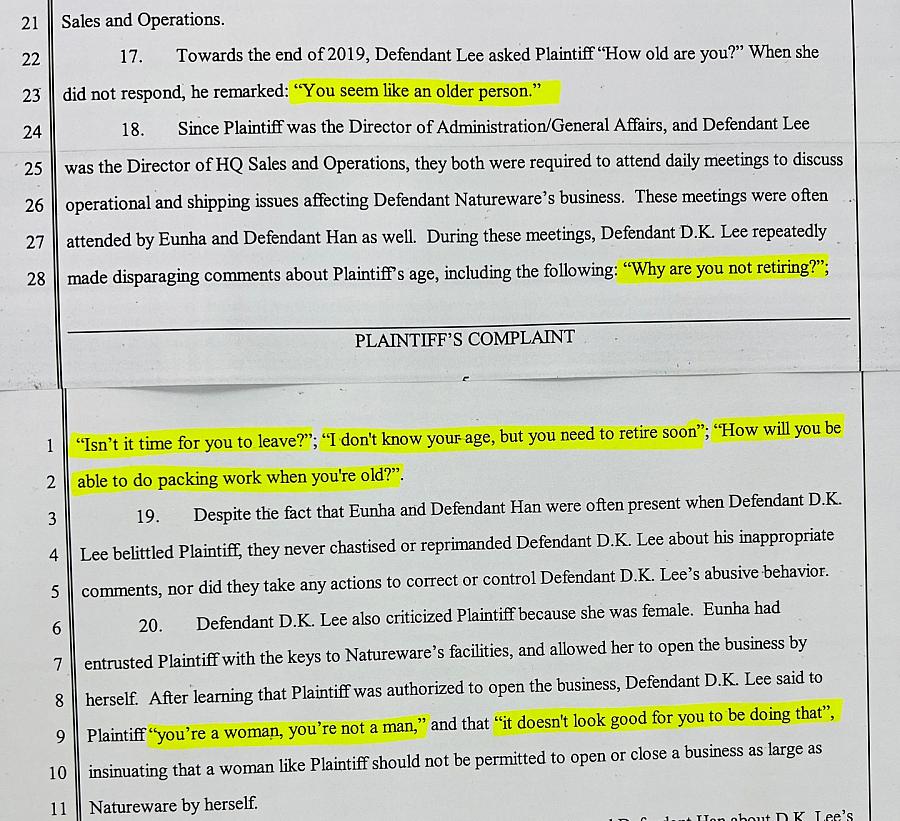Korean-American Seniors Struggle with Workplace Ageism Stemming from Korean Cultural Customs
The story was co-published with the Korea Daily as part of the 2024 Ethnic Media Collaborative, Healing California.

Anesthesiologist Young Seok Suh and his coworkers after a surgery
Courtesy of Young Seok Suh
A Korean-American woman won a two-year legal battle after she was fired for advocating improvements at her company following complaints about openly ageist language used by her coworkers.
Soon-Yi Park (pseudonym, 60, female) won a court ruling in her favor for "wrongful termination." Ms. Park filed the lawsuit in Orange County Superior Court alleging that Company N, a Korean-American distributor of dietary supplements in Cypress, fired her for for age discrimination. The company she had worked for acknowledged its responsibility for her wrongful termination in June 2022 and subsequently provided her with a settlement.

Complaint filed against a Korean American company based in Cypress
Courtesy Ms. Park
In her complaint, Park alleged that the company and her employer, Shin, failed to take appropriate action when her coworker, Mr. Lee, told her during meetings that she looked “old,” “why aren't you retiring?” and “maybe it's time to leave the company.” Furthermore, during the employee recruitment process, Mr. Lee blatantly displayed ageism by telling Park that “younger people are better,” “I don't like employers or older people,” and “let's hire older people.” Park felt like she was not accepted. It was when she demanded improvement measures from her employer, Shin and others, that she was fired.
The federal Equal Employment Opportunity Commission (EEOC) publicizes the Age Discrimination in Employment Act (AEDA), enacted in 1967, in Korean and other languages.
This law prohibits employers from discriminating against or firing employees over the age of 40 in the workplace because of their age. In particular, it prohibits employers from making fun of or humiliating employees because they are older.
However, some Korean-American companies have been found to tolerate or condone age discrimination in the workplace. While the phrase “age is not a barrier to retirement” is popular in the U.S., some Korean-American companies may pressure older employees due to cultural customs.
Bullying and pressure stress
Park, who filed a lawsuit against Company ‘N’, was recognized for her competence as a general affairs manager, but was eventually bullied and pushed out because of her age. Only after being sued did Company N and her employer admit to wrongdoing.
Lawyer Joo Chan-ho said, "Most companies don't directly mention age when they pressure older employees." adding that some Korean companies "make comments that can apply to age, such as "your work performance is not good," or "you work too slowly." The employee feels stressed and pressured because he or she feels like, "they're trying to corner me and push me out because I'm older."
Heesook Kim (pseudonym, 60s), a Korean-American employee at a mid-sized company in Los Angeles for over 20 years, was also abruptly laid off just before the COVID-19 pandemic. Kim says she could not accept it because she had worked for the company for so long. She believes age was a factor.
Eventually, Kim hired a lawyer and filed a civil lawsuit. In addition to Kim's wrongful termination claim, her lawyer also filed a class action lawsuit for unpaid overtime. The company eventually settled the case for more than $1 million after more than three years of litigation.
“When an employee who has worked for a company for a long time is not satisfied with the reason for termination, he or she believes that the company intentionally discriminated against his or her age and pushed him or her out. In such cases, they want to get the compensation they deserve from the company.” Lawyer Joo said.
Employees who are actually fired for age discrimination raise red flags for their mental health.
“When an employee is fired for age discrimination, it takes a huge toll on their existence, including financial hardship,” Dr. Susan Chung, a psychiatrist, said.
“They are especially traumatized by the feeling that ‘the company or society doesn't need my (older) presence’. For Korean American men, work is often an 'identity' that proves who they are. This can lead to depression, including lethargy, insomnia, and low self-esteem, as well as poor physical health.”
Cultural customs contribute to the problem
Especially in Korean-American companies, cultural customs that emphasize age have been found to cause discrimination. Some branches in the United States with headquarters in Korea may discriminate on the basis of age following instructions from the headquarters.
In Korea, the retirement age is set by law. According to the relevant law, office workers can work up to the age of 60. However, most of them have to retire if they are over 60.
“Korean companies, especially headquartered in Korea, often ignore U.S age discrimination laws,” Joo said.
“Sometimes the headquarters will tell them to fire an older employee, regardless of U.S law. The branch manager or supervisor is then often forced to follow the headquarters' instructions. Some Korean headquarters will tell them to fire older employees even if it means risking a lawsuit.”
Korean companies also often impose a workplace culture that may violate U.S. labor laws.
According to Korean-American lawyers, Korean-American companies often share a rigid hierarchy based on seniority, a seniority culture that has no legal basis, and negative perceptions of older people.
For example, when a boss is young, the perception that older coworkers are difficult to deal with is accepted without question.
On the other hand, the overemphasis on age among Korean-American employees also contributes to conflict.
English-speaking employees who grow up in the U.S perceive their coworkers as equals and don't treat them with special respect or treatment because they are older. However, employees who are accustomed to the Korean culture may impose a culture of respect for older colleagues, such as bowing and greeting.
Importance of a horizontal work culture
Korean-American lawyers agree that it is important to comply with labor laws, such as age discrimination laws, and work to establish a level workplace culture.
“Many employers are unaware that they cannot discriminate against or fire employees over 40 because of their age,” said Kim Hae-won, a lawyer.
“Employers should not fire employees based on age, pregnancy, disability, race, religion, etc. In particular, employees who file a wrongful termination lawsuit can claim that the employer's actions were illegal and against public policy, and can also seek punitive damages.”
In fact, a paper titled “Age Discrimination and Suicidal Ideation Among Korean Older Adults” by Dr. Ki-Yeon Kim and Dr. Min-A Lee from the Department of Sociology at Chung-Ang University in South Korea found that seniors who experienced age discrimination were 2.3 times more likely to have suicidal thoughts.
Actively working in 80s without age discrimination
The American norm of accepting older people in the workforce has led to an increasing number of Korean American seniors continuing to work into their 70s and 80s. They emphasize that maintaining employment allows them to fulfill their personal aspirations and look after their health.
Young Seok Suh, 82, an anesthesiologist who served as the Chairman of the Peaceful Unification Advisory Council LA, is still an active doctor. St. Vincent Eye Surgery Center in Koreatown, where he has worked for 15 years, has no intention of letting him go.
“I’m proud to know that I’m still needed somewhere at this age,” Suh said, ”and I’m grateful that the hospital staff recognizes my abilities even though I’m past retirement age. I will continue to work until my hands start to shake.”
Susan Chung (79), a psychiatrist, also runs a mental health YouTube channel and gives consultations and lectures. “When I was younger, I worked to make money and survive, but now I’m happy to do what I really want to do,” she said.
Some seniors retire around the age of 65 and take on new careers. Security guards and Uber drivers are especially popular among Korean-American male retirees. They said that even with generous pensions, it’s hard to live without work. For some, working is a way to cope with depression.

David Ahn, 71, has been working for three years as a security guard at an office building in Koreatown. “I spent 10 years not working after retirement, but the daily routine without having to work was just unbearable,” he said. ”I wanted to challenge myself with something new, so I took the security guard test. There are many places looking for senior security guards. If you are bored with your daily routine, I recommend that you try something new.”
The story was supported by the USC Annenberg Center for Health Journalism and is part of “Healing California,” a yearlong reporting Ethnic Media Collaborative venture with print, online and broadcast outlets across California.
